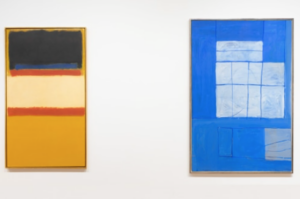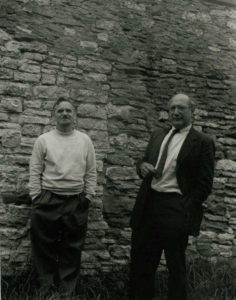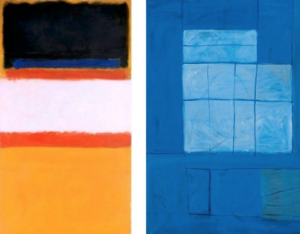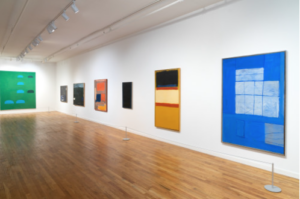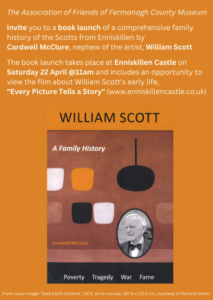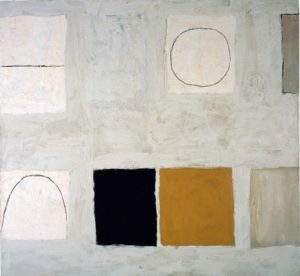How many artists bathe in the reflected glory of stars like the American Abstract Expressionist, Mark Rothko (auction record $87 million)? Some are simply pastiches, existing to decorate wall space. Others bear more serious consideration accruing value by association. Thus New York dealer, Anita Rogers finds it stimulating to pair British artist William Scott (auction record a mere £1 million) with Rothko in her latest exhibition which runs until 3 June. The two crossed paths on both sides of the Atlantic in the 1950s, corresponded and compared notes. The pairing will, says Rogers, “solidify [Scott’s] significance, and offer new insight into their relationship and mutual admiration.”
Tag Archives: William Scott
East Side Feed Features Mark Rothko and William Scott
Anita Rogers Gallery Presents Mark Rothko and William Scott: Continuing the Dialogue
By Bobby Panza
Portrait of William Scott (on left) with Mark Rothko (on right) at the Scott home in England. 1959. Photo by James Scott. © James Scott.
When Mark Rothko and William Scott first met in New York in 1953, both painters were at a pivotal time in their lives. Introduced by gallery owner Martha Jackson, Rothko and Scott had each evolved their artistic roots from figurative painting and were now charting new waters in the world of abstraction. The relationship between these twentieth-century masters is at the center of a thrilling new exhibition coming to Anita Rogers Gallery at 494 Greenwich Street from April 26 to June 3.
Large-scale works on canvas will be accompanied by preparatory drawings on paper as well as correspondence between the two artists. This historic pairing of Rothko (1903-1970) and Scott (1913-1989) has never been done before.
Left: Mark Rothko Untitled (Red, Yellow, Blue, Black and White), 1950 Oil on canvas 67 1/2h x 38 1/4w in 171.45h x 97.16w cm. Right: William Scott CBE RA, Abstract (Blue East), 1964 Oil on canvas, 73h x 48w in 185.42h x 121.92w cm
Similar to Martha Jackson who brought Rothko and Scott together, the female-owned Anita Rogers Gallery has been known for fostering relationships between artists, as well as collectors and lovers alike, since it opened its doors in 2016. This unprecedented exhibition will not only feature the relationship and mutual admiration Rothko and Scott had for one another, but also the influence and respect of opinion they had for one another, as both artists were also immigrants.
Rothko immigrated to New York City from Latvia in 1913 while Scott grew up in Scotland before moving to England to study at the Royal Academy Schools in 1931. Scott would eventually earn the CBE (Commander of the Order of the British Empire) in 1966 for his contributions to art.
In the summer of 1959, the Rothko family were guests at the Scott’s cottage in Somerset, England. Both sides discussed concerns over placing art in public spaces, as well as their experiences as immigrants.
Now, the children of Mark Rothko (Christopher and Kate) and William Scott (James) will continue the dialogue at a special discussion at Anita Rogers Gallery on May 9. You can register for this free event here.
Anita Rogers Gallery is open Tuesday-Saturday from 10 a.m. to 6 p.m. The gallery will be publishing a full-color catalog featuring an essay by David Anfam, art historian and author of Mark Rothko: The Works on Canvas.
View on EastSideFeed.com
ArtForum Must See: MARK ROTHKO and WILLIAM SCOTT
Installation view of MARK ROTHKO and WILLIAM SCOTT: Continuing the Dialogue (2023).
Photo by Jon-Paul Rodriguez
Thank you to ArtForum for listing our current exhibition, MARK ROTHKO and WILLIAM SCOTT: Continuing the Dialogue as a must-see exhibition. On view through June 3.
Book Launch | William Scott: A Family History by Cardwell McClure
The Friends of Fermanagh County Museum is organising a book launch on Saturday, 22 April, at Enniskillen Castle, showcasing Cardwell’s “William Scott: A Family History” publication.
Every Picture Tells a Story (90 mins) feature film based on the early life of William Scott, directed by James Scott with Alex Norton, Phyllis Logan and Natasha Richardson will be shown as part of this event.
Enniskillen Castle Facebook Page
Enniskillen Castle Fermanagh County Museum Twitter
ABOUT THE BOOK:
The author of this family history is Cardwell McClure, son of Mary McClure, née Scott, the younger sister of renowned artist William Scott CBE, RA. Cardwell remembers how his mother told him that William, when a teenager, would get his younger sister to sit for him lacking any other willing members of the family.
This book provides a first hand experience of the family’s trials through poverty, tragedy, war and fame.
There are twelve chapters in the book, eleven of which are devoted to each child, while the first chapter outlines the family beginnings in Glasgow, Scotland.
As Paul Teggart, the editor of the book says: “It is a wonderful story of triumph over adversity, sadness and happiness, and family loyalty. I can say, without a doubt, that the book is a labour of love and has only been completed after many years of dedicated research and a fine eye to detail by its author Cardwell McClure. It makes good reading whether you look at it from a family point of view or from an educational standpoint in examining the life and work of William Scott the artist.” A chronology of the Scott family dating from 1887 to 2022 is also being published alongside the Family History.
The Family History book can be bought on Amazon via the following link: www.amazon.co.uk
William Scott: A Family History which has taken many years in research, writing and editing partly due to the ill health of the author, Cardwell McClure, is lavishly illustrated with paintings by William Scott CBE RA.
William Scott on View at the Barbican
A revelatory new take on art in Britain after the Second World War, a period when artists had to make sense of an entirely altered world.
Postwar Modern explores the art produced in Britain in the wake of a cataclysmic war. Certainty was gone, and the aftershocks continued, but there was also hope for a better tomorrow. These conditions gave rise to an incredible richness of imagery, forms and materials in the years that followed.
Focusing on ‘the new’, Postwar Modern features 48 artists and around 200 works of painting, sculpture, photography, collage and installation. It explores the subjects that most preoccupied artists, among them the body, the post-atomic condition, the Blitzed streetscape, private relationships and imagined future horizons. As well as reconsidering well-known figures, the exhibition foregrounds artists who came to Britain as refugees from Nazism or as migrants from a crumbling empire, in addition to female artists who have tended to be overlooked.
Morning in Mykonos, 1960-61 is one of five works by William Scott which can be seen at the exhibition.
By Postwar Modern New Art in Britain 1945-1965
Pictured above: Morning in Mykonos, 1960-61 © Copyright William Scott Estate. Courtesy of William Scott Foundation.
View more on Barbican.org.uk
View on AnitaRogersGallery.com
William Scott: Abstracting and Appreciating the Everyday
William Scott: Abstracting and Appreciating the Everyday
by Chloë Ashby

Five Pears 1976
William Scott (1913–1989)
British Council Collection
Art UK:
To some art critics, the twentieth-century British artist William Scott’s kitchen-table still lifes are too timid – as Roberta Smith wrote in The New York Times, they can be seen as ‘abstract paintings for people who don’t like abstraction’. Others, myself included, find them enticingly reduced and for the most part easily readable, which is part of their charm.
Scott’s compositions are striking in their simplicity, and somehow both pleasurable and puritan, sensuous and serene. A few boiled eggs, a couple of ripe pears, fresh mackerel on a plate, pots and pans, a bunch of grapes: these are his humble subjects. As he once said, ‘I find beauty in plainness’.
Born in Scotland in 1913 and brought up in Northern Ireland, Scott’s surroundings were grey and barren, his upbringing strictly Presbyterian. The objects he painted in an often-sombre palette were, he said, ‘the symbols of the life I knew best’.
After his father died trying to save some folk from a burning building, the local council raised funds to send the 15-year-old to Belfast College of Art. From there, he won a scholarship to study at the Royal Academy of Arts in London, where he bunked up with the poet Dylan Thomas and two other Welshmen and married fellow student Mary Lucas. In the Second World War, he was a cartographer, and in its wake, he was a pioneer of British abstraction.

Cardwell McClure, William Scott’s Nephew, Featured on BBC
In this podcast, Cardwell McClure, the nephew of William Scott, shares the connection he had with the acclaimed artist.
Available online until mid-March.
William Scott at Anita Rogers Gallery
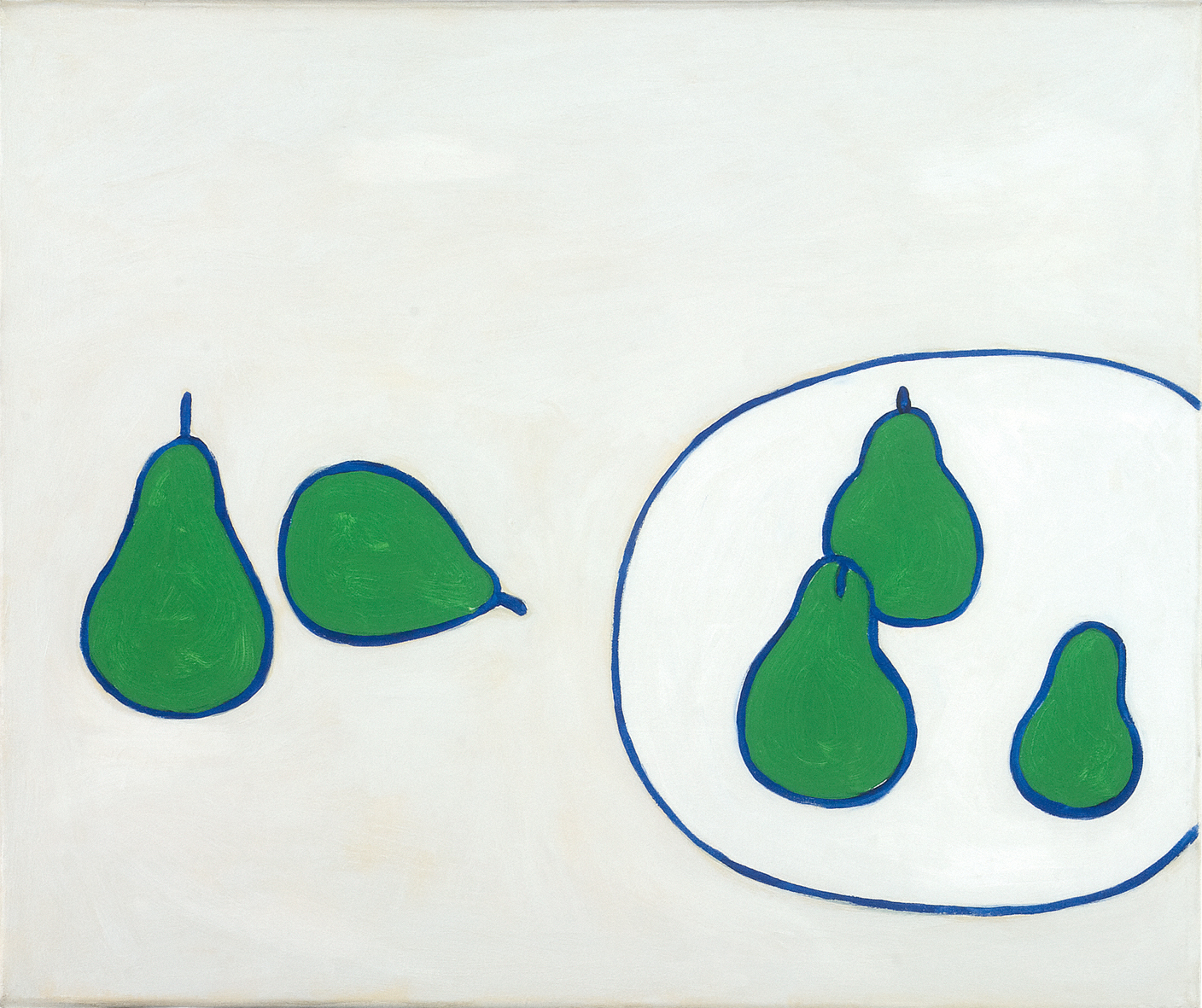
Antiques Trade Gazette: William Scott Reintroduced to the US
In 1953, British artist William Scott (1913-89) made his first inroads into the New York art scene.
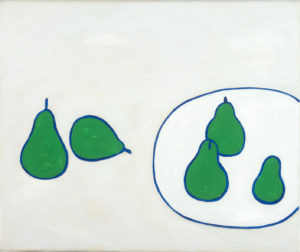
Still Life. Pears. 1977. Oil on canvas. 16″ x 20″ © Estate of William Scott 20
James Johnson Sweeney, director of the Guggenheim, went to an exhibition of his work in London and reported to gallerist Martha Jackson: “At last England has a painter.”
Jackson represented Scott throughout the 1950s, introducing him to figures such as Pollock, De Kooning and Kline. In this period, he was inspired particularly by another Abstract Expressionist, Mark Rothko, who befriended Scott and visited him in the UK.
Though the British painter’s international profile grew, it was eventually overshadowed in 1960s New York when pop art and Conceptualism came to dominate the art scene.
Now, Big Apple gallery Anita Rogers aims to put the artist back in front of the city’s art lovers. William Scott: Paintings and Drawings focuses on works from the 1950s-80s, including some prime examples of his Abstracts and domestic still-lifes.
Read the full article on Antiques Trade Gazette by Frances Allitt
